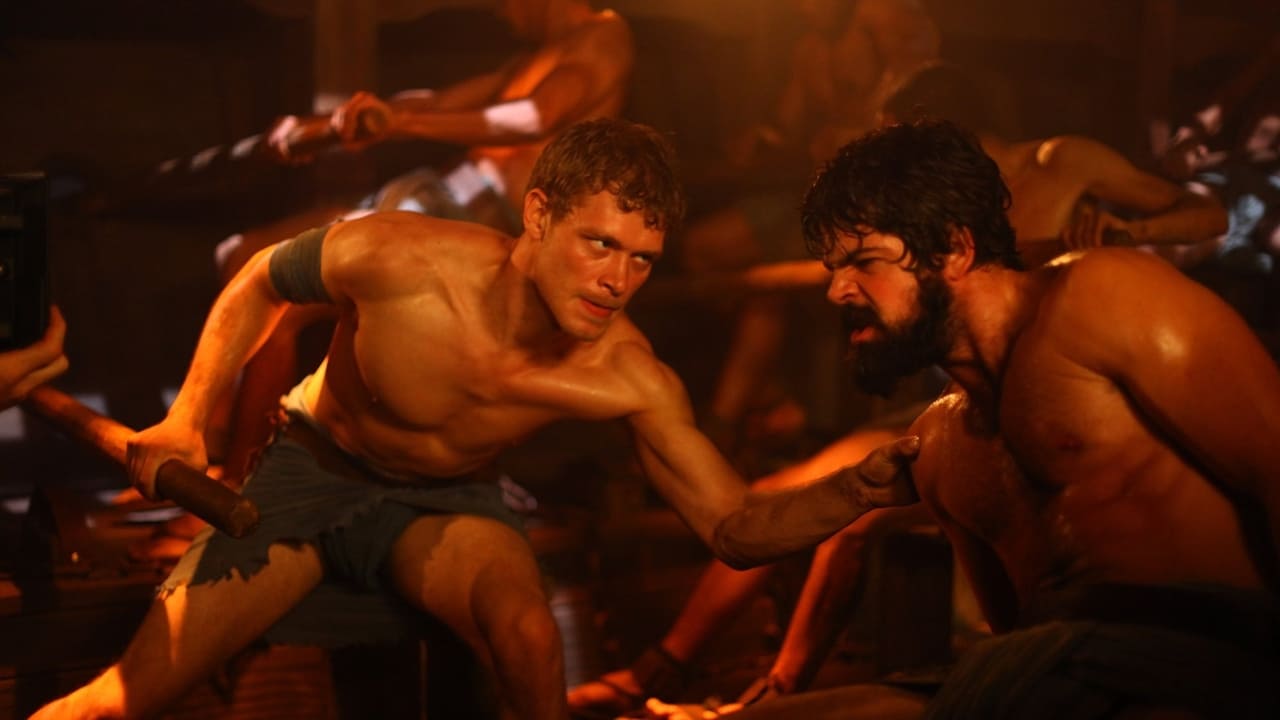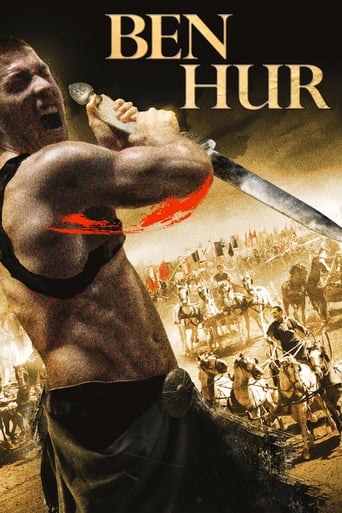

Boring, over-political, tech fuzed mess
... View MoreI am only giving this movie a 1 for the great cast, though I can't imagine what any of them were thinking. This movie was horrible
... View MoreIt really made me laugh, but for some moments I was tearing up because I could relate so much.
... View MoreThe thing I enjoyed most about the film is the fact that it doesn't shy away from being a super-sized-cliche;
... View Morefirst impressive thing is the ambition to create a new adaptation to a classic book. than to look the best way to be more than a great movie remake.and not the last, to have success. result - an adaptation for new generations. not original but good. interesting, giving new nuances - Stephen Campbell Moore does a real seductive Messala, more credible than in 1959 version, Ben Cross is a realistic Tiberius and Joseph Morgan is far to be another Charlton Heston. but the last fact could be a virtue because it is Ben Hur of a new time, part of a chain of blockbusters who use the Greek- Roman mythology and histories.so, a good film. for script, cast but, more important, for science to present a story in right nuances. and that fact is important.
... View MoreThe main problem with these mini miniseries (2 episodes) is that the screenwriters forgot that the novel was subtitled " a tale of the Christ";and all that concerns Jesus is botched ;Wyler never showed his face and all his appearances in the 1959 version were memorable ,particularly when he gives some water to Ben Hur en route to the galleys.The first part of Lewis Wallace's- who said he was influenced by French writer Alexandre Dumas and his "Comte De Monte Cristo"- novel was entirely devoted to the Magi and the nativity.Ben Hur and Messala only appear simultaneously on page 74 of my edition!One should also note that there's an episode,never transferred to the screen ,when Ben Hur tries to raise an army to fight Rome and to save Jesus.He gives up,on the Golgotha,because a divine invisible intervention tells him HE must die.Joseph Morgan,as an user has already pointed out by an user ,is too "Nordic" to be a convincing hero;Emily VanCamp as Esther is too gamine to compare favorably with Haya Harareet in the 1959 version.Nevertheless ,the story is catchy and entertaining,in spite of (or because of) the changes the script has undergone:Messala ,for instance,is (so to speak) still alive -like in the novel-when the Christ is crucified;characters not present ,either in the silent version or in Wyler's were introduced in a tale even more melodramatic than the original: a Greek slave/courtesan who is skilled in love making (There is a hot sex scene between her and a virgin(?)Ben Hur)and in "special" beverages-perhaps an equivalent of Wallace's perfidious Iras;and a treacherous Jew named David,in love with Esther ;the valley of the lepers is ,if we are to believe the screenwriters,a safe place ,as we see Esther bringing bread to the unfortunate sick outcasts ;in Wyler 's version ,she kept her distance ,at least in her first visits.(in the book ,it's a servant who feeds the poor women and takes them to the Christ)The political side,on the other hand ,is more detailed in the MTV work in the first sequences ,and Messala's attitude makes more sense after the tile incident (caused by the hero,like in the book,not by his sister).By the way,the mother,Miriam (no name in the book)has become Ruth,we can wonder why.And in the end,the death of Messala is more human than in the 1959 movie or in the book ,in which the character works behind the scenes:he and Ben Hur do not have any conversation when they meet again.Save it for a rainy day:it's no masterpiece,and the chariot race seems cheap ,but the subplots are numerous,the hints at Juda/Messala childhood are relevant and the supporting cast is up to scratch,with Ray Winstone,the stand out.Best scene:the suicide of Arius in his bath ,as the water turns red.
... View MoreThe first and the biggest mistake of this movie that at some scenes the makers thought that Ben-Hur was Spartacus. He was not. Spartacus is a different movie and has nothing to do with the Ben-Hur story. 1. The scene from Spartacus (when the Thracian tries to kill the Caesar instead of Judah) should not be shown here. 2. Judah was not a Gladiator. He was a racing driver. 3. Quintus Arrius haven't died before Judah went back to Israel since in the original movie he sent his ring back to him. 4. We don't care about the childhood of Judah and Messala. We know that they were the best friends and that's it. 5. On the galley Judah was not number 40 but number 41. 6. He did not tell his name to Quintus after three days of saving him, but Quintus asked his name right after. 7. We don't know the name of Quintus' son. We only know that he had a son. 8. Galley-slaves did not tell anything to their prisoners about shipping. 9. It's not Judah who caught sight of the other ship at the battle but someone behind him. 10. First he was chained to the ship and Quintus asked to prisoner to take the chains of before the battle.There are many more mistakes in the movie but I think this many is more than enough to make your own decision about it. My suggestion: avoid!
... View MoreThe 1959 version of "Ben-Hur" is without a doubt one of the truly great motion picture epics, so it was with surprise, and dismay, that I saw this 2010 re-make mini series appear on my local TV channel, and against my better judgment started to watch, what could only be, this travesty. To my surprise I found within 30 minutes I was totally hooked and engrossed by a deeply touching and superior Television experience. What it lacks in sheer magnificence of the 1959 version, it more than makes up in the human story of a family torn apart by terrible misfortune and fate. Wisely the makers chose a superb young cast in the leads, with Joseph Morgan (as Ben-Hur) and Stephen Campbell Moore (as Messala) not only doing justice to these epic characters but imbuing them with true human emotions. The story is very much the same as the original, and even though it was said the makers played down the religious aspect, I personally found that by doing this they actually heightened it in some respects to truly wonderful effect, especially during the last hour of the story which left this viewer with more than a few tears in his eyes. Naturally the sexual aspect is more explicit, but if one watches the original 1925 silent version you realize that is is something which has always been there but left and only implied in the 1959 version. The famous chariot race of the 1959 version can never be duplicated and the film makers obviously did not have the budget or tried to do so, but apart from that, if you have the opportunity to see this version, do yourself a favor and do so. I think, like me, you will be pleasantly surprised.
... View More